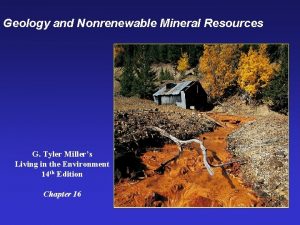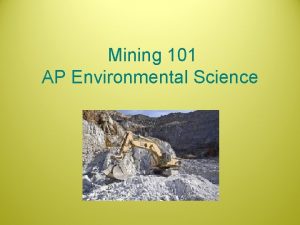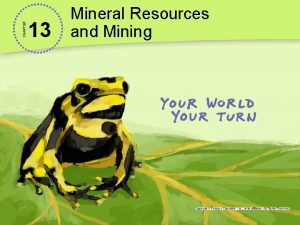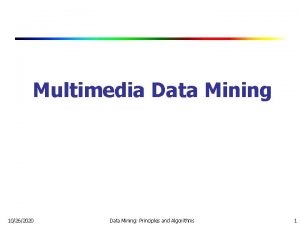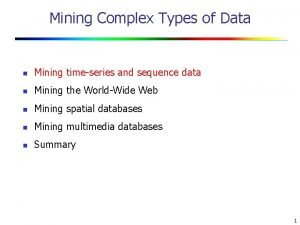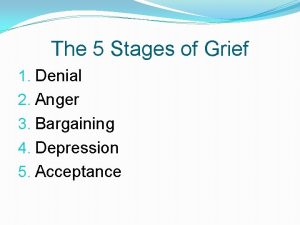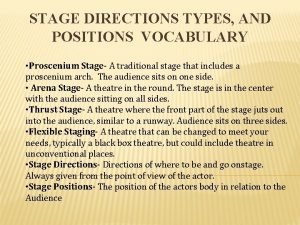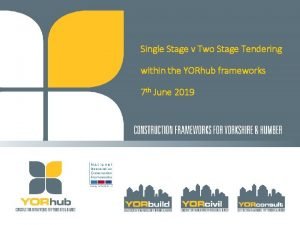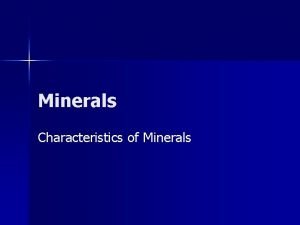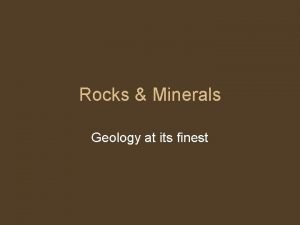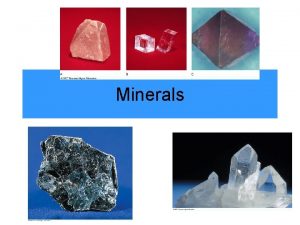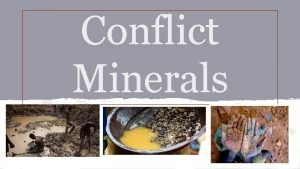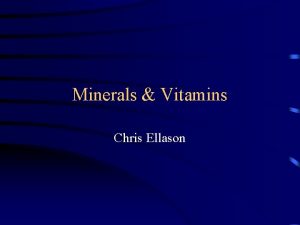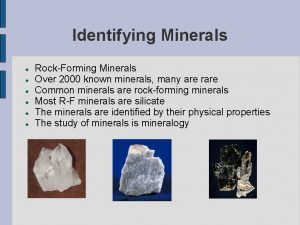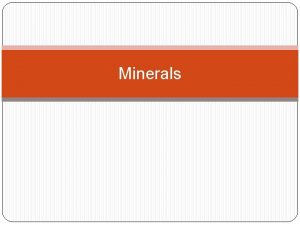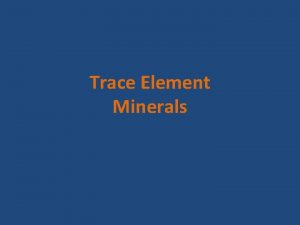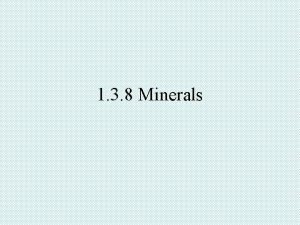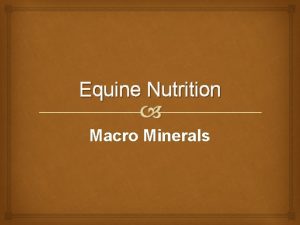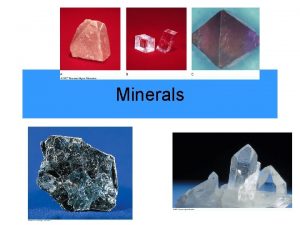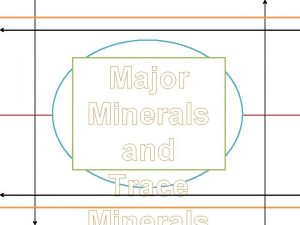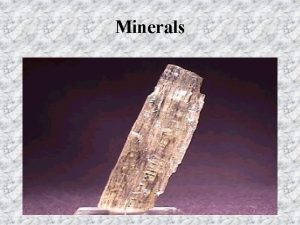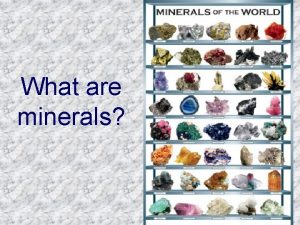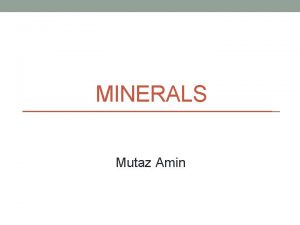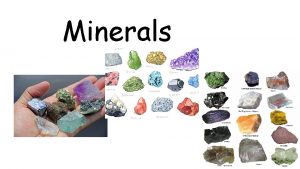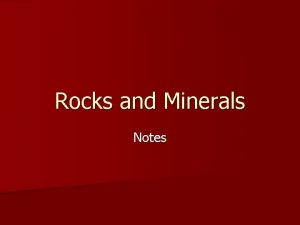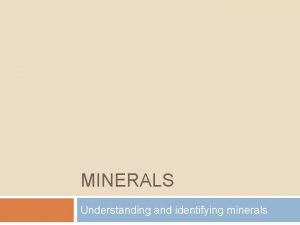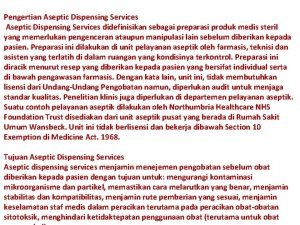PREPARASI minerals Mining in the world economic stage



















































- Slides: 51

PREPARASI minerals

Mining in the world economic stage, particularly where the work sampling, and calculation preparasi quality or mineral content is absolutely necessary.

Sampling is • How to take mineral samples representing an area. Before taking the first sample survey carried out. (Preliminary research), which covers a wide area.

Goal sampling take the example of extractive operations can represent areas of research, for the purpose preparasi raw materials or mineral materials yanag be ready to be processed (menaikan mineral content). While the calculation of a measure that forecasts eksplorer already know the value mineral so that it can determine the operating whether or not the prospects.

I. SURVEY Preliminary research can be done with: • Air Photos: with the aircraft / satellite • Dipermukaan direct measurement of land: • a. Geomagnetik: attributes of a magnet deposition • b. Geolistrik: nature of the power deposition • c. geophysical: a reflection of sediment waves (harder faster mule) The resulting map (I) the map scale 1: 25000 (map anamali) the indications of the lands of mineral sought. • d. Geo chemistry: chemical nature of the mule.

II. PHASE-up (follow up) • • • Advanced stages of the research is done in the areas anomaly after anomaly map of the resistance I In the advanced stages of the research carried out activities that include: 1 st Traverse Grid soil geological map of 1: 5000 Trencing Test pit

1. 1. Traverse • Is a survey towards the river upstream and percabangannya. • The principle is to create a straight line disungai in a certain way that investigators can still be seen. Sample taken from the tranverse obtained from the outcrop, generally on the sample distance of 50 m is tranverse or susuai field conditions. • Equipment used in general: • Kompas • Klinomater • Tape measure • Supporting equipment (ropes, map, HCl, foldlens / lens-fold)

1. 2. Soil Grid • Conducted as a follow rivers traverse katena grid soil survey is usually conducted in the mountains found a river. In the event this is done the sample soil / land, chip sampling. The difference with the rock: influenced by the soil organisms. • Rock chip sampling of rock sample with a chisel / hammer geology and the results floured or core. 1. 3. Trenchine • System pengmbilan sample with the groove / grip on the body of rock / minerals that are still fresh.

TEST PIT • The sample is in the area that has not tererosi but are located in the depth of which is difficult to achieve. • Sample processes of a small part of the captured sampelnya but represent part of the overall (quartering sampling)

III. GRID LINE Retrieval method is an area on the sample traverse the river to find out the actual rock layers that may be advanced out of the rock (outcrop) during the traverse. In the event of grid lline sample can be done with: soil sampling (SO), Rock Chip Sampling (R C).

The principle of the grid line: Make a straight line on a lap and then determine the point-point sample. Wellknown term "b ASE line" (the basis of making the other), "C ross friends" line is made to the base line of the directions north - south,

Stages to create a grid line. – Determine the direction of the compass point of the pioneer. – Tape measure to analyze the distance can still be seen flag tape measure, In general – With p. mak 20 m when the ribbon is not possible Bantu 5 m. 10 m. 15 m. 20 m/25 m – Measure the slope (gradient) – Determine the distance to 12. 5 m for geomagnetic measurements.

IV. MACAM-MACAM SAMPLE – Sample BULG (Bl) • Type of sample taken from the sediment in the river bank. or on the bot because the possibility of valuable minerals involved. Taken with a shovel and then filtered with a ¼ #, weight = 10 kg. – PENNED Consent (PC) • This type of sample taken from the hole and sample = bulg only + - 4 more shots down from the BL. Sample and then fed. Once finished filtered 4

3. STREM Sample sediments (SS) – Terbawah taken from the hole on the sample pan Pendulangan sampling conducted 2 x 1 x water medusa soap suds and water with diayak - 80 # weight 300 gr. Adding weight. 4. ROCK float – Taken on the outcrop in the normal flow of the river, a form of fraction / of coarse fragments. Sample background to the background shows the donkey into the guidelines so that the deposition sought (mineral adjuvant).

• 5 th Sample ROCK CHIP (CHIP Sample) – Taken on the rock that is still fresh / mineralisasi contain valuable metals. Many + 1 Kg. • 6 th Sample specimen (SP) – Taken didaerah river outcrop I found that is still fresh, berfariasi (vulkanik on the rock), while for the rock sediment berfosil to determine the geological age, Weight = 1 kg sample. • 7 th Soil Sample – Taken with a grid line method didaerah hill / slope / valley soil taken in the BC horizon Number of sample = 0. 5 + kg - 1 kg

Phases of work: • • Study literature Regional history Map of local reports Field preparation – tools – supplies – work plan (Station)

Station Note: • • I breezy Tufaan sandstone, pumice breksi II Dawung There are mining activities and the establishment of bba Mangkang III / Sidomulyo Zeolit / geological structure IV Coral short Trass

How sampling • • How boring: With a core or Core For both core sample / bor same sample treatment.

Stages of sample handling: Acceptance stage sample: This stage to receive a sample from the field equipped with the basic data: the sample location of sample type / minerals, the number of sample point based on the sample. (Core drilling, drill bangka / impire drill, test wells (tesipit).

Stage of sample processing: At this stage, acceptance is a sample of cloth from the explorasi / exploitation. Samplesample that came from the field if he comes from drilling, the sample included in the sample bag (Tray). Sample can be transported via land, air, speedboard from the location of sample, which in the Core sample box until after the lab. Set on a table in accordance with the core location. Core washed with soap removes the mud patch in the soil sample. Core is arranged near the original.

Labelling (labeling) Providing information on the sample tray be done in the paint covering the lote / drill hole number box, the interval (distance depth) Size in the interval from the left side of the core until the end of the depth reached in the beginning can be measured through the core box before / next. At the core interval measurements should be carefully correct meaning core destroyed / broken dirapatkan be so near the original order. Spidol Tools needed anti-air, tissue dryer (clean meter)

Defining core recovery (R%) Core Recovery is a long reach into each of the drilling. So long core length is measured from the core to the core box 1 box other core / next R= Panjang yang diperoleh x 100% kemajuan Pemboran

RQP (Rock Quality Designation) Is the length of core obtained in the drilling progress of each piece. So the length is measured between 2 cores, while the value of block size is determined by the length of drill core (2 x D = diameter core). If the length of core 2 x D RQD said its full = 0. Core a severe impact not considered a tool corenya utuh. 1 Marking sampling intervals of 3 meters. Size 3 m core drilling depth marked. Measurement intervals can be measured 3 m from the core box with a way to reduce the depth listed in corebox into multiple notes with the 3 m core approach of Lo.

V. Determine the degree Sample Each core box according to the progress of drilling, calculated value = own self. For each core value analysis is done using the knife fission cores for low berkadar minerals. Berkadar While the high use fission core saw (in the form of motorized electric saw). Core is the be the one living in it / core processing.

Treatment is not core sample: Stages: • sample sent to laboratory • sample included kekantong sample • given sample labeling • sample sent for analysis • way analysis: – microscope – chemical – radio active

The purpose of sample • to determine the degree of mineral sought. • determine the reserves in the mineral deposit • determine unsure-that there are elements in the mineral matrix minerals • type of metal • baker of oil, coal •

Metal Type – assay – nature of the metal – metal-metal follow-up Fuel: • coal: coal kalori/1 kg; carbon CC) sulfur; other elements. • petroleum: CH, candles, aspaltis, gas

Preparasi sample • weight (a number that is easily calculated) • washing • then in the dry, we get the slime / dust (in the form of material Loos), be pondered again. • The, some faction / be pondered • microscope analysis / quartering

Kenampakan minerals under the microscope: Zeolit • - Dark = opaque minerals • - = Brown hornblende, verdure • - Klorit = green contrast kebiruan Breksi pumice • - Dark = opaque minerals • - = Lithic fragments • - Klorit = green contrast kebiruan • - Silica cement = straw yellow

Sandstone tufaan - Quartz = straw yellow - Olivine = change / filamentous - Felspards = gray - Such as clay = Ca but dirty - Magnitik = dark

PREPARASI Preparasi is • The process of the preparation of minerals that are ready to be processed. The idea to separate the valuable minerals to the mineral that is not even worth sampahnya.

To separate the valuable minerals and precious and we do not identify the physical nature of such color / sheen, sg (specific grafity), the nature kemagnitannya, kelistrikannya nature, and nature float or sink

Physical Operation nature Tools Warna Hand sorting Pan SG Flawing concentration ging Kemag Ms nitan Electrik Hts Flotasi Sluice box ji Shaking table JIG MS HTS Flotation

• Preparasi than separate quality menaikan also pressing for the cost of operating the next especially in the transportation and pengoalahan. • Results blasting • lump (lump) • kuarse (smooth) • Processing called communation (diminution grains) with the crusher.

Crusher have three kinds, namely: • primary crusher • secondary crusher • fine crusher / grinding

Diminution Butir size minerals (Communation) • In general, minerals from the mine have the size or diameter of between 1000 -1500 mm (in the form of ore / ore). Ore will then be taken logamnya the benefit with a how or bebrapa way, ie, the chemical and physical. The grain size requires a more subtle about 0. 1 mm. so very dependent of the size of equipment used. To get the size of a small tool used separti crusher and grinding. As a comparison, if the primary crusher or grinding initial 1500 -300 mm size, the smallest size of 300 -100 mm. • Tool Feed Results 1500 Primary crusher-300 mm 300100 mm Secondary crusher 300 -100 mm 50 -10 mm Fine crusher 50 -10 mm 10 -2 mm Grinding 2 mm 0. 05 mm / smaller

The principle of work and washing the mineral (ore dressing) Washing is a method of mineral processing ore / ore with a chemical does not cause an effect, but the physical nature of the mineral.

The main objectives of the minerals / ore to separate from the physical ikatannya dirt / tailing. Results from the ore concentrate is called, while the other middling and tailing. Middling material berkadar is low, while the tailing material or waste polluter.

Ore =konsentrat+ middling+ tailing / waste (ore kadar tinggi) (ore kadar rendah) (sampah) Concentrate in processed metalorgi Middling returned to the washing Tailings / waste disposed Mine unit of The stone breaker (crusher) (sorting)

Several methods of separation of mineral with the tools used: • pemisahaan using the hand (hand sorting) this is done in a way to separate minerals based on violence, grain size, shape, color. • based on the friction • based on the nature of electricity • based on the nature magnitik • based on specific grafity • based on the weight of the media • based on the nature of float / sink • etc.

To obtain a final concentration of mineral processing stages required with tools that match, as follows: • • • diminution used grain size communitions (breaker stone tools) such as crusher, grinding. product of the crusher / grinding the grains of varying size. To separate the concentrate according to the size butirnya be sizing / measurements. classifying is the separation due to the fall speed Screening

The tools there are three types: • Trunk – stem is a filter that is used to separate the size of Boulder didaerah out early. Filter is placed in the out-first to separate Boulder. Filter size of about 25 mm is made of wood / metal structured such that the order form the wood / metal flat.

The tools there are three types: • 2 nd Plate – Plate is a flat filter (vibrating / resonance) is created and stratified rock made from steel / metal. Assisted with the separation of particles from the filter the vibration digerakan by tanaga electricity. The size of each hole of the process depends on the next. • 3 rd round – Round the filter cylinder (round / revolving) that rotates the filter.

• We are doing the classifying and screening to meet the market demand. With provision: • • Classifying => 20 mesh Screening = <20 mesh

Factors-factors that affect the speed of The: • broad surface • slope ayaan • water contents • of each hole • the form of mineral

1. Primary Crusher - Black jaw crusher – Stronger power press – Greater capacity – Products vary 2. dodge jaw crusher – power press weaker – smaller capacity – uniform product

Secondary crusher • Rool crusher Consists of: • Rigit (both rotary) • Spring (one of which rotates, while the silent one)

How to Feed infusion: – Cuke crusher That is stacked bait before destroyed – Free Crushing That is a little destroyed, but surely destroyed the ongoing progress

Fine Crushing using ballmil, roodmil, tubemil. 1. Cascading putarannya slowly dominate the abrasion not able to take over 2. Cataracting Lap slightly faster Able to bring the material up, and the material falls Then there were impact 3. kecepatan critical High speed All participate because of the style rotary centripetal

The formula calculates the speed : N= Round Cell (Rpm) D= Diameter Cell R= Fingers Cell S= Diameter Mill s= Diameter Media BM < 80% Cascading > 80% s/d 90% Cataracting RM < 50% Cascading > 50% s/d 60% Description N= N= N=

O V E R
 Economic minerals
Economic minerals Strip mining vs open pit mining
Strip mining vs open pit mining Strip mining before and after
Strip mining before and after Difference between strip mining and open pit mining
Difference between strip mining and open pit mining Web text mining
Web text mining Mining multimedia databases in data mining
Mining multimedia databases in data mining Mining complex types of data
Mining complex types of data Economic growth vs economic development
Economic growth vs economic development Growth and development conclusion
Growth and development conclusion Economic systems lesson 2 our economic choices
Economic systems lesson 2 our economic choices Mining world wide web
Mining world wide web Stage 2 denial
Stage 2 denial Stage right
Stage right Proscenium stage diorama
Proscenium stage diorama Single and two stage tendering
Single and two stage tendering Stage right stage left
Stage right stage left Stage left vs stage right
Stage left vs stage right Hình ảnh bộ gõ cơ thể búng tay
Hình ảnh bộ gõ cơ thể búng tay Lp html
Lp html Bổ thể
Bổ thể Tỉ lệ cơ thể trẻ em
Tỉ lệ cơ thể trẻ em Chó sói
Chó sói Glasgow thang điểm
Glasgow thang điểm Chúa yêu trần thế alleluia
Chúa yêu trần thế alleluia Các môn thể thao bắt đầu bằng từ đua
Các môn thể thao bắt đầu bằng từ đua Thế nào là hệ số cao nhất
Thế nào là hệ số cao nhất Các châu lục và đại dương trên thế giới
Các châu lục và đại dương trên thế giới Công thức tiính động năng
Công thức tiính động năng Trời xanh đây là của chúng ta thể thơ
Trời xanh đây là của chúng ta thể thơ Mật thư anh em như thể tay chân
Mật thư anh em như thể tay chân Làm thế nào để 102-1=99
Làm thế nào để 102-1=99 độ dài liên kết
độ dài liên kết Các châu lục và đại dương trên thế giới
Các châu lục và đại dương trên thế giới Thơ thất ngôn tứ tuyệt đường luật
Thơ thất ngôn tứ tuyệt đường luật Quá trình desamine hóa có thể tạo ra
Quá trình desamine hóa có thể tạo ra Một số thể thơ truyền thống
Một số thể thơ truyền thống Cái miệng xinh xinh thế chỉ nói điều hay thôi
Cái miệng xinh xinh thế chỉ nói điều hay thôi Vẽ hình chiếu vuông góc của vật thể sau
Vẽ hình chiếu vuông góc của vật thể sau Thế nào là sự mỏi cơ
Thế nào là sự mỏi cơ đặc điểm cơ thể của người tối cổ
đặc điểm cơ thể của người tối cổ V. c c
V. c c Vẽ hình chiếu đứng bằng cạnh của vật thể
Vẽ hình chiếu đứng bằng cạnh của vật thể Vẽ hình chiếu vuông góc của vật thể sau
Vẽ hình chiếu vuông góc của vật thể sau Thẻ vin
Thẻ vin đại từ thay thế
đại từ thay thế điện thế nghỉ
điện thế nghỉ Tư thế ngồi viết
Tư thế ngồi viết Diễn thế sinh thái là
Diễn thế sinh thái là Các loại đột biến cấu trúc nhiễm sắc thể
Các loại đột biến cấu trúc nhiễm sắc thể Số nguyên tố là
Số nguyên tố là Tư thế ngồi viết
Tư thế ngồi viết Lời thề hippocrates
Lời thề hippocrates
